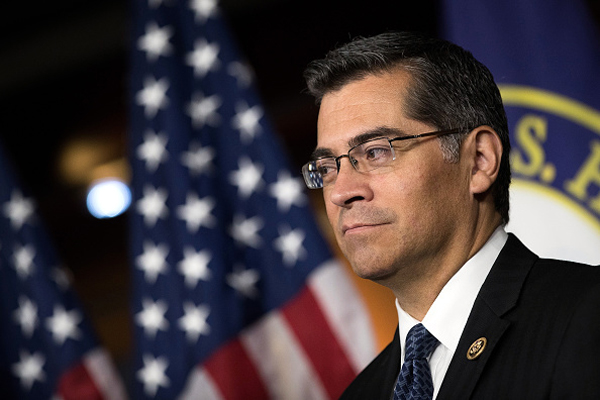- La Feria Community Holds Succesful Business Mixer Event
- Little Nashville to Take Place in Downtown Mercedes
- Lions Basketball Captures District Gold
- La Feria ISD Students Compete in Regional Chess Tournament
- Lions End First Half of 32-4A on a High Note
- La Feria ISD Held Another Successful Parent Conference
- Strong Appearance for Lions at Hidalgo Power Meet
- LFECHS Students Get to Meet Local Actress
- Students Participate in Marine Biology Camp
- Two LFECHS Students Qualify for All-State Band
Boycotts Over ‘Religious Freedom’ Bills Could Cost Texas Billions
- Updated: July 7, 2017

Calif. Attorney General Xavier Becerra issued a ban on state employee travel to Texas, with Texas’ new state law legalizing discrimination against LGBTQ families in adoptions. Photo: Angerer/GettyImages
by Mark Richardson
AUSTIN, Texas — The predicted economic backlash against Texas has begun in protest of the state’s new laws that allow discrimination in the name of religious freedom.
Last week, California banned official travel to Texas by state employees in response to a Texas state law allowing foster care and adoption agencies to disqualify LGBTQ families for “sincerely held religious beliefs.” Dozens of other states and groups say they’re also considering economic boycotts.
Dan Quinn, communications director with the Texas Freedom Network, said the sanctions should come as no surprise to the lawmakers who advocate for “religious freedom” bills that discriminate.
“It’s not like folks weren’t warning that this would happen before legislators gave this special protection to adoption and foster care agencies that discriminate,” Quinn said. “But now they want to double down on all this in the special session with this ridiculous bathroom bill.”
He is referring to a controversial bill coming up in July to regulate which restrooms transgender people can use.
In the regular session, lawmakers passed an anti-sanctuary cities bill allowing police to ask people in custody about their immigration status. Hispanic groups claim it will lead to racial profiling.
Quinn said he believes conservative Republicans are pushing such measures as a form of “political theater,” which he warned could have an unhappy ending for Texas.
“What they are proposing here solves no problem; there is no problem. So, the only reason they’re doing this is for political reasons,” he said. “What we’re really seeing here is this slow motion economic train wreck, and the special session could turn that into a full-on disaster.”
Quinn said a study by business leaders found an organized boycott could cost Texas more than $8 billion and 35,000 jobs. The state also could lose business from conventions, tourism and sports leagues like the NCAA, the NBA and the NFL.
“Once you get beyond the moral problem with it, you have the economic problem with it,” Quinn said. “At that point, you do begin to wonder, ‘Will this register with them? Do they see this as a big problem with leaders?'”
Other states – including Alabama, North Carolina and South Dakota – have seen economic hits from boycotts after passing similar legislation.


